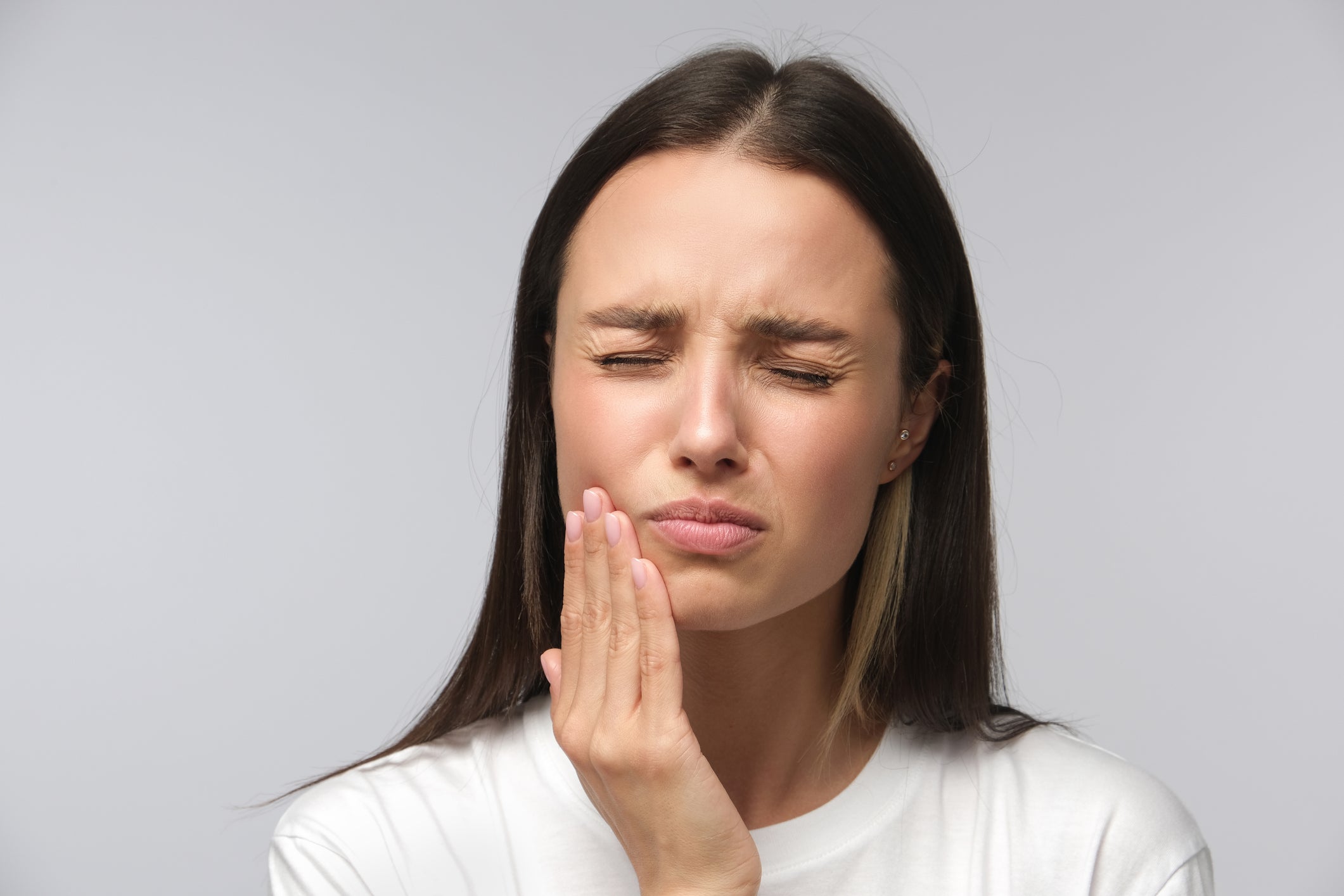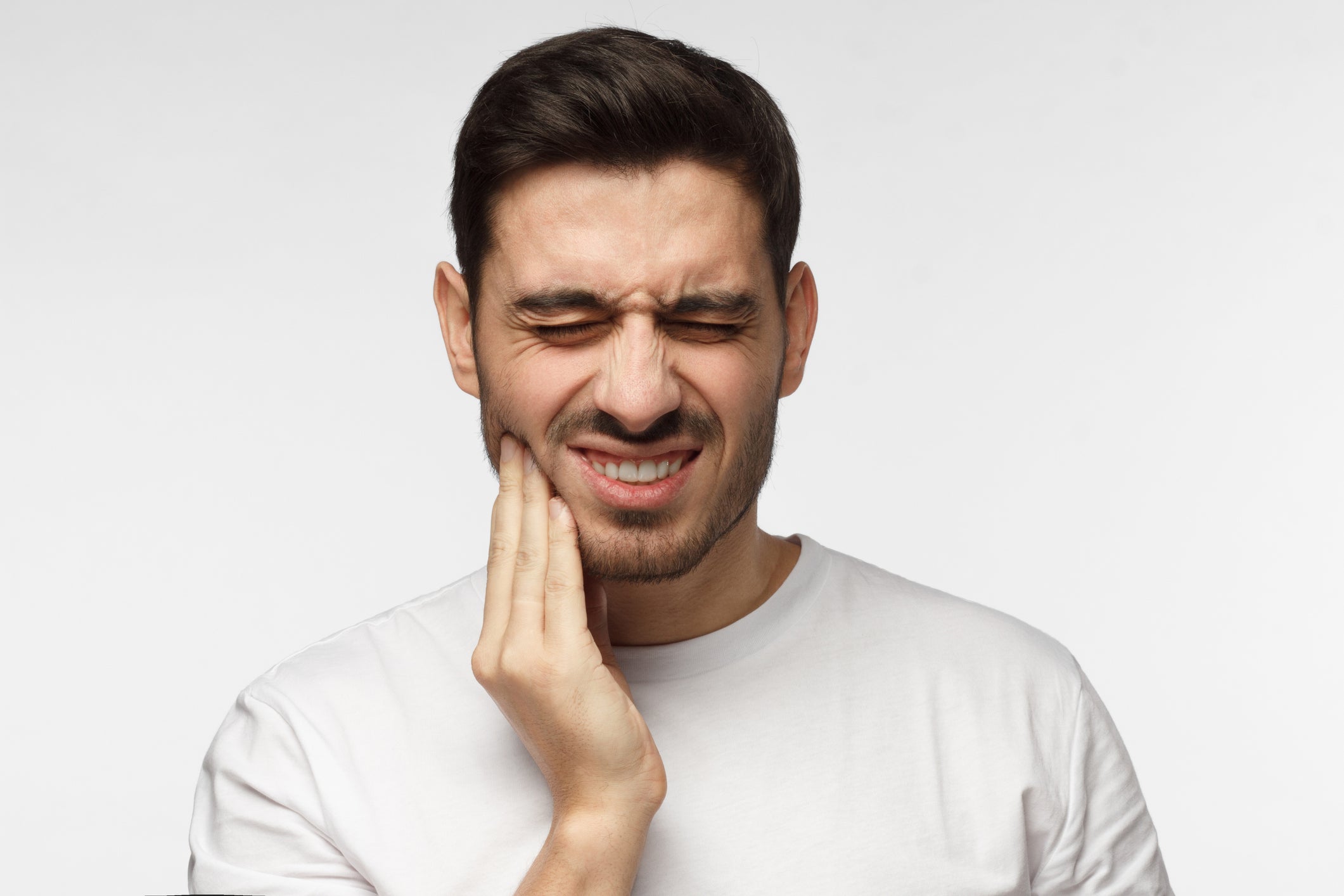-
How to Prevent Cracking Your Teeth

Your bite produces massive amounts of pressure, as much as 5,600 pounds per square inch. Teeth structure is amazingly resistant to this pressure and able to withstand a compressive force of approximately 30,000 pounds. But when you introduce foods and non-foods that are excessively hard, teeth can crack under the pressure. Tiny cracks in your teeth can put you at risk for deeper, more serious cracks and the introduction of dangerous bacteria into the tooth openings. Learn how to prevent cracks in your teeth so you can safeguard your smile for years to come!
Abstain from Foods that Could Injure Your Teeth
While teeth can withstand some tremendous forces, avoid adding extra stress by using them in proper ways. One of the most common ways teeth are damaged are from the foods and non-foods you eat or chew on. Common culprits for teeth cracks include:
- Ice
- Popcorn
- Frozen foods
- Hard candies
- Pens or pencils
If any of these foods or non-foods are a part of your daily routine, consider making some changes to protect your oral health.
Get Treatment for Teeth Grinding or Clenching
Twenty percent of Americans grind their teeth, a condition called bruxism, which is often accompanied by teeth clenching as well. Most people aren’t conscious of this stress-induced condition since it often occurs while they are sleeping. If teeth grinding isn’t treated it can lead to chips, breaks, and cracks in teeth overtime. A custom nightguard by your dentist can help treat the effects of teeth grinding.
Wear a Sports Mouthguard During Athletic Activities
Athletes are also at risk for teeth cracks from impact injuries during activities. The American Academy of Pediatric Dentistry reports that only 22 percent of children wear mouthguards while playing sports. A sports mouthguard can protect teeth from this dangerous source of oral trauma.
Park 56 Dental offers restorative dentistry to repair and prevent cracks in your teeth so cracks don’t jeopardize the health of a tooth or adjacent teeth. Contact us today at (646) 679-3989 if you have any questions about the stability of your teeth. Your health and well-being are our top priority
-
How Your Teeth Impacts the Rest of Your Face

Facial symmetry is a leading factor in what makes you look like you. Maximizing the symmetry of your face not only makes you look better, it makes you feel better as all the interior structures of your mouth and jaw coordinate together. This delicate balance of teeth and jaw functionality depends on the health of your teeth. Learn how missing teeth affect the shape of your face to motivate you in your efforts for professional preventive dental care and proper oral hygiene.
Teeth Shape and Health Make a Big First Impression
Teeth shape and health are felt on a physical and emotional level. How you feel about your smile directly influences your self-esteem. Missing teeth makes eating challenging while also affecting the health of your jaw.
Teeth Affect Face Shape and Symmetry
Teeth support the length of the face and the anatomy of the jawbone. Shorter teeth from frequent tooth grinding can trigger facial asymmetry. A collapsing bite propels the jaw forward resulting in a sunken, hollow facial appearance.
Shifting teeth can cause a once symmetrical smile to become uneven. These shifts can shorten the length of the face and lead to a deeper bite.
Abscessed Teeth Can Affect Your Sinuses and Trigger Bone Loss
The roots of your molars are separated from your maxillary sinuses by extremely thin bone. Infected teeth and gums can spread infection into your sinuses through this pathway, impacting your entire face. Although rare, abscessing teeth can destroy facial bones. If bone health is compromised, bone strength and size is reduced which affects your overall facial aesthetic.
Missing Teeth Can Cause the Face to Cave In
While having a single missing tooth won’t alter your appearance much, it can lead to teeth shifts and changes which directly affect your facial structure. Teeth uphold the shape of your face by:
- Supporting jaw alignment.
- Maintaining facial balance.
- Preventing bone deterioration and jaw atrophy.
- Preserving lip shape by buoying the surrounding muscles.
- Averting jaw fractures and tooth loss from jaw weakness.
Teeth prevent your jaw from shrinking in size. They separate the two jawbones and add length to your face. Teeth roots stimulate the jawbone when you chew. When teeth are missing, the bone of the jawbone doesn’t get exercised properly causing it to disintegrate and atrophy. The lack of the former bone size causes the face to take on a recessed, shriveled appearance.
If you need help bettering your dental health and filling gaps in your smile the dentists at Park 56 Dental have the expertise you require. Contact us today at (646) 679-3989 to learn about your options with cosmetic, restorative, or general dentistry.
-
Dental Emergency: What to Do When a Tooth Gets Knocked Out

Did you know that more than five million teeth are knocked out every year in children and adults? If this happens to one of your loved ones, don’t worry! Quick action can improve your odds of saving the tooth.
Causes of Knocked Out Teeth
Teeth get knocked out for various reasons that all involve an impact to the face. Most often, a tooth becomes knocked out during a contact sport when the participant failed to wear a mouthguard. The most common ways that teeth get knocked out include:
- Sports injuries
- Car accidents
- A fight
- Tripping or falling
Sports-related oral trauma ranges from a chipped tooth to having a tooth completely knocked out. By taking quick action, caretakers can make a big difference on salvaging the damage.
Preserving a Knocked-Out Tooth
Many are unaware that a tooth can be saved even if it is knocked out. Learn what to do immediately after a tooth is knocked out so you can restore your prior smile’s beauty. The following steps are recommended by the American Association of Endodontists to save a tooth that has been knocked out:
- Delicately pick up the lost tooth by the crown (also known as the chewing surface.)
- Use water to rinse the tooth. Only water, nothing else.
- Gently replace the tooth in the original socket at once. Keep it in place with your fingers or by biting down softly.
- Keep the tooth moist in your mouth. If it won’t stay in the socket, place in next to your cheek in your mouth, or in a small container of milk.
- Visit your dentist, endodontist, or emergency department within 30 minutes of the accident. (Some teeth can still be saved if it has been outside the mouth for more than hour but contact your dental provider for specific instructions.)
In the dentist’s office or emergency department, the tooth will either be re-implanted or splinted to the nearby teeth for a period of two-eight weeks. A root canal procedure will be needed for long-term survival of the tooth.
Other Reasons a Tooth May Fall Out
If you lose a tooth due to periodontal disease, the steps listed above will not save the tooth. Prevent this type of tooth loss by proactively visiting your dentist every six months and performing the proper oral care steps at home.
Park 56 Dental offers same-day emergency appointments to get you the critical care you need when a tooth is knocked out. We understand that dental injuries require immediate, personalized care to put your mind at ease and to restore your smile.
Contact us today at (646) 679-3989 if you have any questions about a dental emergency or what to do. Your safety and well-being are our first priority!
-
Why You Should Consider Sedation Dentistry

Sedation Dentistry is an Essential Part of Dedicated Dental Care
A positive patient experience is an important part of excellent dental care. Fear of the dentist prevents too many from taking care of their teeth in a timely manner. Dentists are dedicated to helping their patients feel welcome, comfortable, and enthusiastic about improved oral health and aesthetics through sedation dentistry techniques. Sedation dentistry can eliminate fear before or during treatment!
By the Numbers
An estimated 30% of adults avoid the dentist due to fear. That’s a lot! For many people, they could be suffering needlessly from oral diseases despite modern technological advances that offer them relief and comfort with their dental health care needs. But researchers estimate 75 million US citizens don’t seek dental care that can easily be treated by conscious sedation dentistry or general anesthesia.
What is Sedation Dentistry?
Many people refer to sedation dentistry as “sleep dentistry” but the nickname is inaccurate since the patient does not actually sleep during treatment. Sedation dentistry is a form of dental treatment that significantly reduces pain and makes procedures easier to tolerate.
This process usually involves giving patients time-release injections or intravenous anesthesia, so they can relax during their procedure without being bothered by the sight or sound in any way.
Eight Benefits of Sedation Dentistry
Sedation dentistry is a great option for patients who are afraid or anxious about visiting the dentist. It allows them to receive routine oral care without feeling threatened. It allows their minds to relax during procedures while under close supervision from providers trained in sedation techniques.
Studies have shown that this form of treatment often results in less treatment time compared to those not under sedation. Other benefits of sedation dentistry include:
- Makes the appointment time go by faster.
- Reduces your dental anxiety during and before treatment.
- Encourages you to make your preventive appointments.
- Reduces the strength of your gag reflex.
- Minimizes pain during treatment.
- Helps you sit still for longer procedures.
- Improves your overall health as you better your oral health.
- Offers different strengths of sedation dentistry for ultimate comfort.
Park 56 Dental is IV-certified and licensed by the American Dental Association to deliver sedation dentistry. Our specialty training by the State Board of Dental Examiners allows us to administer controlled medications to foster a comfortable, pain-free experience.
Contact us today at (646) 679-3989 to learn the type of sedation dentistry that is best for you.
RECENT POSTS
categories
- Uncategorized
- Cosmetic Dentistry
- Veneers
- Healthier Teeth
- Teeth Whitening
- Dental Health
- Video
- Dental Emergencies
- Invisalign
- Dental Implants
- Root Canal
- Sedation Dentistry
- Infographic
- Dental Crowns and Bridges
- Dental Anxiety
- Gum Disease
- COVID-19
- Bad Breath
- New York Dentist
- Cut out sugar
- General Dentistry
- Oral Health
- Oral Cancer
- Dry Mouth
- Gum Health
- Toothache
- Dental Sealants
- Cavities



